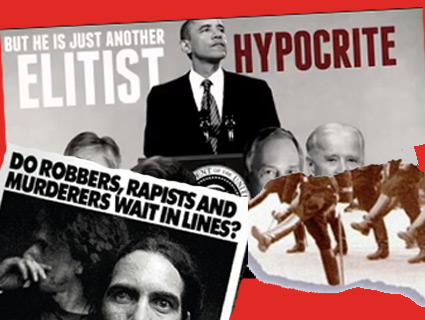
<a href="http://www.shutterstock.com/cat.mhtml?lang=en&search_source=search_form&version=llv1&anyorall=all&safesearch=1&searchterm=pile+of+guns&search_group=#id=125428757&src=BjIUavXrqxG4oUtog70D9A-1-3">Kellis</a>/Shutterstock
The compromise amendment on expanded background checks that Sens. Joe Manchin (D-W. Va.) and Pat Toomey (R-Pa.) announced Wednesday morning has yet to be released to the public. But the senators released a fact sheet on Wednesday afternoon that begins to clear up some answers sought by gun control groups and uncommitted senators. (Read it in full below, via the Huffington Post.)
Titled “The Public Safety and Second Amendment Rights Protection Act,” the amendment expands the existing background check system to cover sales at gun shows and on the internet, “encourages” states to put all their available records into the National Instant Criminal Background Check System, and establishes a National Commission on Mass Violence “to study in-depth all the causes of mass violence in our country.”
Here’s a rundown of additional key components of the Manchin-Toomey amendment as spelled out in the fact sheet:
- People who buy guns from non-licensed sellers or gun owners in the parking lot at gun shows would have to undergo background checks from licensed dealers.
- Online gun sales within one state would require the same background checks from licensed dealers that are currently required for interstate online gun sales.
- Licensed dealers would keep records of background checks they conduct, as they have been doing since 1968, for commercial sales that require checks under existing law. It would not allow the federal government to keep records.
- The federal government would be banned from establishing a registry of gun owners, even though that has already been the law since 1986. People who might misuse records for the purpose of creating a registry would face felony charges and up to 15 years in prison.
- Temporary transfers and transfers between family, friends, and neighbors wouldn’t require background checks.
- Licensed dealers would be able to sell handguns across state lines, instead of only rifles and shotguns.
- Active military members would be able to purchase guns not only at duty stations but also from in-state dealers.
- Licensed dealers at gun shows would be able to sell guns to dealers attending the show from other states.
- Concealed carry permits issued within the past five years could be used in lieu of background checks since the permits themselves require checks.
- States would be encouraged to submit records of prohibited buyers to the NICS background check database, providing grants to help states that comply and reducing funding for those that don’t.
- If an NICS background check was inconclusive after 48 hours, a pending sale at a gun show would be allowed to take place. (In four years, the time would be reduced to 24 hours—the idea being that the database would have improved significatly by then.)
And, the fact sheet adds, the amendment would “not, in any way, shape, or form infringe upon anyone’s Second Amendment rights to keep and bear arms.”
On Wednesday afternoon, several Republican senators said they had yet to digest the amendment’s details. One of them was Sen. Tom Coburn (Okla.), whom Manchin and Sen. Chuck Schumer (D-N.Y.) had aimed to work with prior to working with Toomey—until gun-rights activists apparently got to Coburn.
Late Wednesday, Coburn released a statement calling the compromise the “wrong approach” that would “impose new taxes and unreasonable burdens on law-abiding citizens” and prioritize “collecting records over protecting citizens.” Still, Sen. John McCain (R-Ariz.), who has supported expanded background checks in the past but remains on the fence now, said he believed the legislation would survive filibuster threats and get a vote.
















